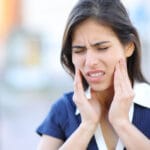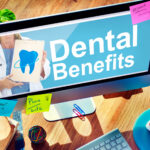What are you going to eat today? It’s a question you answer over and over, every day of your life. For some, these decisions are made relatively quickly. Others devote a significant amount of time planning out their meals. But did you know that a balanced and nutritious diet will not only benefit your overall health, but directly affects your oral health as well? Let’s see how.
The Benefits of Good Nutrition

Oral tissues are constantly recycling throughout life, and good nutrition plays a large role in supporting this process. Healthy, nutritious foods make for strong teeth and gums.
Good nutrition begins even before birth. A baby’s teeth begin forming in the sixth week of pregnancy, hardening in the third or fourth month. It’s important during this time that an expecting mother take in plenty of calcium, vitamin D, phosphorous, and protein – which are all important to the development of the teeth. Dairy products (including milk, cheese, and yogurt), green vegetables (such as broccoli and kale), and certain meats are all good sources of these nutritional elements. After the child is born, the need for these vitamins and nutrients continues as teeth and gums continue to develop.
In contrast, certain foods – such as those with high sugar content – produce higher levels of cavity-causing bacteria. Additionally, poor nutrition affects the entire immune system, which puts you at increased risk for disease and hinders your ability to fight infection. Of course, this includes infections and diseases of the mouth, including periodontal disease and oral cancer. A high intake of fruits and vegetables, on the other hand, helps fight this risk.
Best Practice
What should you include in your diet? Varying factors including age, gender, height, weight, and level of physical activity will have a bearing on the answer. Your doctor or nutritionist can help you to answer that question.
Regarding your oral health, the following two principles apply to everyone:
- Variety: There’s no substitute for a well balanced diet. Eating different types of foods – fruits and vegetables, breads and cereals, milk and dairy products, and various sources of protein – helps you to get the nutrition you need.
- Moderation: Don’t supersize! Marketing and advertising can easily persuade you to eat more than you need – especially of the foods that are worst for you and your teeth. Get to know your specific needs and danger areas regarding calories, fat, cholesterol, sodium and sugar. (You may find the following website helpful: choosemyplate.gov)
Do’s and Don’ts
Cheeses, milk, chicken or other meats, and nuts help protect tooth enamel by providing calcium and phosphorous. (This aids the natural process of remineralization, which re-deposits minerals into tooth enamel that have been removed by acids.) Firm and crunchy fruits make for delicious snacks, and a steady intake of water will also help you maintain your supply of saliva (which helps wash away food particles and neutralize acid).
Poor food habits include eating too much candy and junk food and drinking sweet, sugary drinks (such as sodas and energy drinks). Did you know that one 12-ounce can of soda may have up to 10 teaspoons of sugar? That sugar feeds the harmful bacteria that live in your mouth, allowing it to produce acids that eat away at your teeth’s enamel and form cavities. These drinks are also highly acidic, which means they begin eroding teeth on contact. This leads to tooth decay and can cause serious problems over time.
Of course, we all have sugar cravings at times. When you do, try eating fresh fruit or yogurt instead of cookies and candy. If you have to have that especially sweet treat, eat is as part of a meal instead of alone…or follow it up with a small piece of cheese to increase your saliva production. Avoiding sugary drinks is best. But if you decide to have one, be sure to rinse your mouth out with water afterwards. And don’t brush your teeth right away! This can easily erode your tooth enamel, which has already been softened by the enamel. (Try waiting at least an hour before brushing.)
A final note: Remember that when you eat can be just as important as what you eat. Continuous snacking doesn’t give your saliva the chance to neutralize the harmful acids that inhabit your mouth. If you’re going to eat sweets, try to do so only at mealtimes. Resist the urge to eat just before bedtime. And don’t forget to brush!
If you follow these principles, you’ll extend the life of your teeth – and find yourself in better overall health, too.



